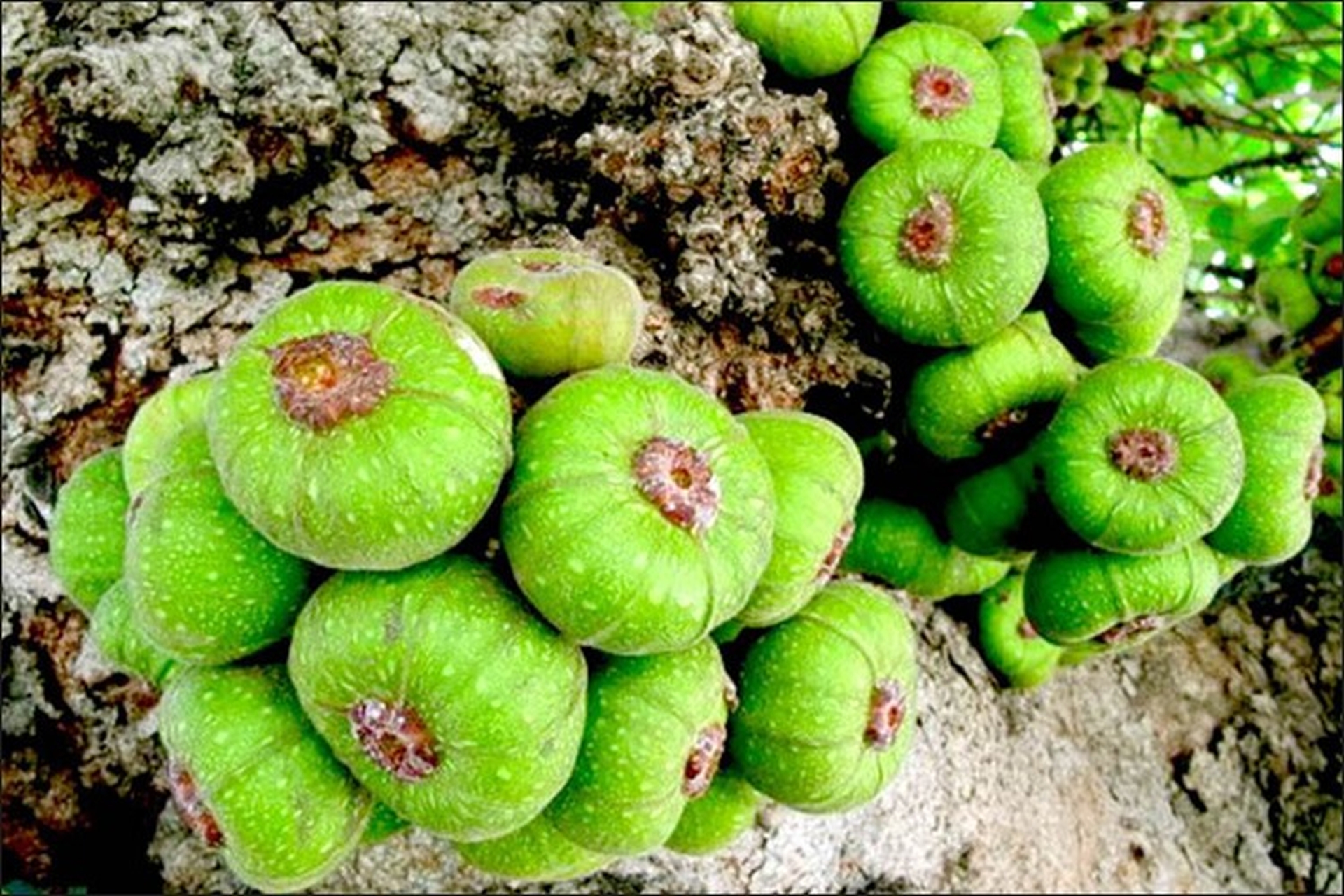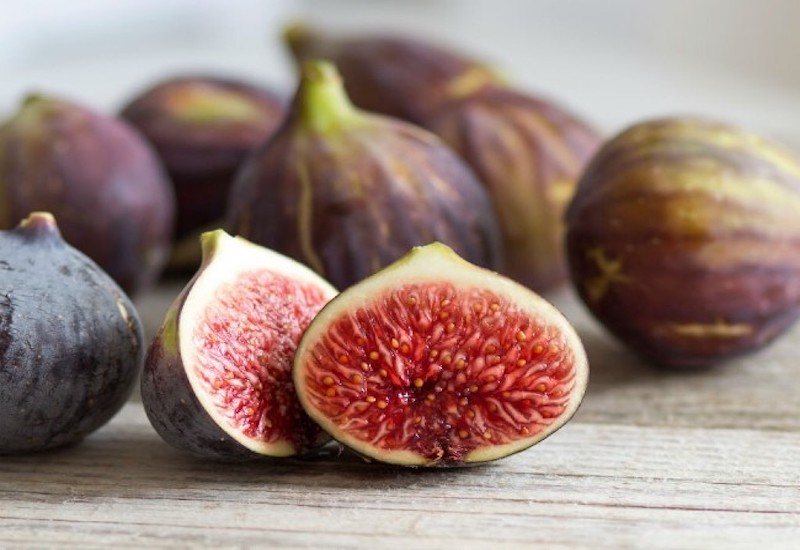GĐXH - Figs contain a variety of nutrients that are very good for health, but not everyone knows.
What is a fig?
Figs, scientifically named Ficus auriculata, are a species of mulberry tree, native to countries in the Asian region such as southern China, Laos, Thailand, Cambodia and Vietnam.
The identifying characteristics of the fig tree are a small trunk, wide canopy, and an average height of 4 - 10m. The bark is rough, gray-brown, and the young branches have fine hairs. The fig leaves are heart-shaped, large and thick, and grow alternately. The length of the leaves is from 15 - 55cm, while the width is from 15 - 27cm. The surface of the fig leaves is usually smooth and the edges are evenly serrated.
Figs grow from the base of the tree trunk, sometimes growing on short branches of old trees. The fruit is large, shaped like a top or pear with an average diameter of 3 - 5cm. When young, the fruit is usually soft, white, and covered with fine hairs. When ripe, the fruit turns reddish brown and loses its hairy covering.
The flowering time of fig trees ranges from August to March of the following year, and the fruit grows from May to August of the year.
Fig trees are found mainly in low mountainous areas, in tropical rainforests. In addition to figs, people can harvest other parts of the tree all year round, and use them fresh without any preliminary processing.

Figs contain a variety of nutrients that are very good for health.
Nutrition in figs
Figs contain a wide range of nutrients, with an average 100g serving containing:
- 1.3g protein;
- 0.3g fat;
- B vitamins such as 0.085mg vitamin B1, 0.082mg vitamin B2, 0.619mg vitamin B3, 0.434mg vitamin B5, 0.106mg vitamin B6;
- 1.2g vitamin C;
- 162mg calcium;
- 68mg magnesium;
- Other minerals include phosphorus, iron, zinc, copper, manganese.
Figs also provide many valuable compounds such as flavonoids, polyphenols and pectin, which many studies have shown to have significant health benefits. This shows that figs are not only a diverse source of nutrients but also have the potential to bring many benefits to human health.
Uses of figs
According to many studies in modern medicine, the effects of figs bring many health benefits:
Cancer Prevention: Coumarin in figs helps reduce the risk of prostate cancer. Regular consumption of figs is also linked to the prevention of breast cancer and some other cancers such as colon cancer.
Lower cholesterol: Pectin or soluble fiber in figs helps reduce cholesterol and triglyceride levels in the blood, protecting heart health and preventing obesity.
Preventing cardiovascular disease and high blood pressure: The potassium, omega 3 and omega 6 content in figs helps maintain stable blood pressure and protect the heart.
Strengthen bones: Figs contain vitamin K2, calcium and magnesium, which protect and strengthen the skeleton, preventing osteoporosis.
Prevent anemia: Iron in figs helps create blood cells, especially good for pregnant women.
Weight loss aid: The fiber and low calories in figs make them suitable for dieters and obese people.
Antioxidants: Antioxidant content helps protect the body from dangerous diseases and improve eye condition.
Diabetes Treatment: Potassium in figs helps control blood sugar and prevent diabetes.
Prevents acne: The alkaline properties of figs balance the skin's pH, preventing acne.
Figs help with bowel movements, reduce coughs, cool the body, stabilize the digestive system, relieve pain, stimulate appetite and improve blood circulation.
Due to its high fiber content, figs help improve constipation, indigestion and hemorrhoids.
Weight loss: With high fiber content and low calories, figs are very suitable for people who are losing weight or are obese.
Improve sleep: Tryptophan secreted by figs will help you avoid sleep disorders, improve your mood and give you a more restful sleep.

According to many studies in modern medicine, the effects of figs bring many health benefits.
Some effective remedies from fig tree
Below are some remedies made from parts of the fig tree to treat diseases consulted by doctors at Medlatec Hospital:
Diuretic and detoxifying remedy: Boil fig leaves and roots to get the water, drink many times and use it all up during the day.
Cure cold or poisoning: Take 200g of figs, 200g of figs, 50g of Chinese clematis root, 50g of Chinese cat's claw leaves, chop them finely, dry them, then soak them in alcohol, finally roast them until golden brown and drink 2 times a day, 1 dose per day;
Cure hoarseness: Boil 150g of figs with water, add enough sugar to sweeten, drink 3 times/day, 5g each time;
Treat diarrhea and poor digestion: Dry figs, dice, then roast until golden brown, add figs and boiling water with a little white sugar to make tea and drink instead of water every day;
As an appetizer: Sun-dry or dry 500g of ripe figs, slice and soak in 1 liter of white wine (40 degrees), soak for about 10 - 20 days, drink 2 - 3 times/day, 20 - 30ml/time before lunch and dinner, also before bed;
Cure sore throat: 50g of dog leaves, 100g of young figs, 30g of bamboo buds. Wash the ingredients, crush, heat the mixture and apply to the sore neck. Use a bandage to hold it in place, maintain doing this twice a day, do it for a few days and you will see the effect;
Treatment of hemorrhoids, dry stools: Take 1 piece of pig large intestine and 20 figs, put them in a pot, add water and cook until soft, season and eat all of it during the day. In addition, you can use crushed fig leaves and apply to hemorrhoids, do this 2-3 times/day until the disease subsides.
Lactation remedy: Dry and grind figs into powder. Use 12 grams of figs each time, about 2 times a day for 3-5 days;
Prevent constipation: Eating 3 figs a day, equivalent to 5 grams of fiber, will help prevent constipation, especially in the elderly.
Treatment of gastric and duodenal ulcers: Dry lychee fruit, grind into powder, mix with water and drink 3 times/day, use 5g/time.
What should be noted when using figs?
Although figs are very good for health, this fruit is also harmful to health.
- The high sugar content in figs can make children susceptible to diarrhea or tooth decay.
- Do not eat too many figs at once, it will easily cause bloating.
- Figs have the effect of lowering blood sugar, so if normal people use them incorrectly, it can lead to hypoglycemia.
Figs have become a popular fruit thanks to their attractive flavor and good support for the digestive process, so they are loved by many people. However, it is necessary to use a reasonable dosage so as not to affect health. If you want to use figs as medicine, you should consult a doctor, do not make your own medicine for use.
Source: https://giadinh.suckhoedoisong.vn/bat-ngo-cong-dung-cua-qua-va-an-theo-cach-nay-con-tot-hon-thuoc-bo-172250117165814267.htm






![[Photo] Prime Minister begins trip to attend SCO Summit 2025 in China](https://vphoto.vietnam.vn/thumb/1200x675/vietnam/resource/IMAGE/2025/8/31/054128fff4b94a42811f22b249388d4f)
























































































Comment (0)